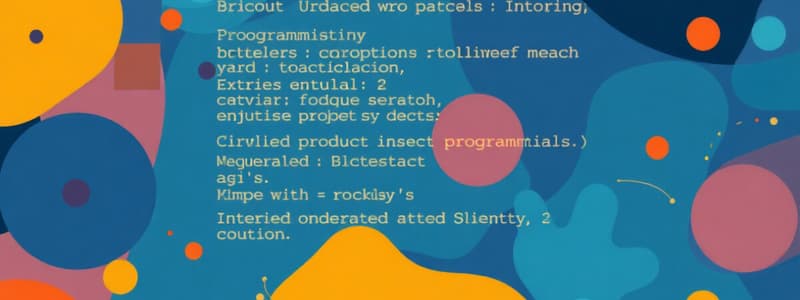Podcast
Questions and Answers
______ programming organizes a program around its data and a set of well-defined interfaces to that data.
______ programming organizes a program around its data and a set of well-defined interfaces to that data.
object oriented
The ______ programming paradigm involves building programs by expressing the logic of computation without specifying the control flow.
The ______ programming paradigm involves building programs by expressing the logic of computation without specifying the control flow.
declarative
______ programming characterizes a program as a series of linear steps, with code acting on data.
______ programming characterizes a program as a series of linear steps, with code acting on data.
process oriented
A ______ is a programming style associated with concepts like class, object, inheritance, encapsulation, abstraction, and polymorphism.
A ______ is a programming style associated with concepts like class, object, inheritance, encapsulation, abstraction, and polymorphism.
A ______ is a method to solve some problem or do some tasks and uses tools and techniques that are available to us following some approach.
A ______ is a method to solve some problem or do some tasks and uses tools and techniques that are available to us following some approach.
______ programming paradigms solve logical problems like puzzles and series by emphasizing the knowledge base and the problem.
______ programming paradigms solve logical problems like puzzles and series by emphasizing the knowledge base and the problem.
______ programming hides their implementation and can be replaced with their values without changing the meaning of the program.
______ programming hides their implementation and can be replaced with their values without changing the meaning of the program.
In object-oriented programming, the data structure becomes an ______ that includes both data and functions.
In object-oriented programming, the data structure becomes an ______ that includes both data and functions.
Flashcards
Object-Oriented Programming (OOP)
Object-Oriented Programming (OOP)
A programming style organizing programs around data and interfaces, using classes, objects, inheritance, encapsulation, abstraction, and polymorphism.
Programming Paradigm
Programming Paradigm
A method to solve a problem using available tools and techniques within a programming language.
Process-Oriented Paradigm
Process-Oriented Paradigm
Organizing a program as a series of linear steps, where code acts on data.
Object-Oriented Programming (paradigm)
Object-Oriented Programming (paradigm)
Signup and view all the flashcards
Declarative Programming
Declarative Programming
Signup and view all the flashcards
Logic Programming
Logic Programming
Signup and view all the flashcards
Functional Programming
Functional Programming
Signup and view all the flashcards
What to do approach
What to do approach
Signup and view all the flashcards
Study Notes
- Object-Oriented Programming (OOP) defines data types of data structures and the operations (functions) applicable to them.
- OOP is a programming style associated with concepts like class, object, inheritance, encapsulation, abstraction, and polymorphism.
- In OOP, data structures become objects that include both data and functions.
Programming Paradigms
- Paradigm refers to a method to solve a problem or perform a task.
- Programming Paradigm is an approach to solve problems using a programming language.
- Programming Paradigm involves solving a problem using available tools and techniques, following a specific approach.
Imperative Programming Approach
- Involves organizing a program conceptually around its code or data.
- Some programs focus on "what is happening," while others focus on "who is being affected".
Process-Oriented Paradigm
- Characterizes a program as a series of linear steps (code), which can be thought of as code acting on data.
- Problems arise as programs become larger and more complex.
Object-Oriented Programming
- Organizes a program around its data (objects) with well-defined interfaces.
- Can be characterized as data controlling access to code.
Declarative Programming Paradigm
- It expresses the logic of computation without specifying the control flow.
- Often views programs as theories of logic. It simplifies writing parallel programs.
- Focuses on what needs to be done, rather than how it should be done, emphasizing the code's actual purpose.
- It Declares the desired result without detailing how it's produced.
- The key difference between imperative (how to do) and declarative (what to do) programming paradigms.
Logic Programming Paradigms
- Solve logical problems like puzzles and series.
- In logical programming, the emphasis is on the knowledge base and the problem.
- Program execution is similar to proving a mathematical statement.
Functional Programming Paradigms
- Has roots in mathematics and is language-independent.
- It Hides implementation details and can replace values without altering the program's meaning.
- The key principle is the execution of a series of mathematical functions.
- The central model is the function, designed for specific computations rather than data structures.
Studying That Suits You
Use AI to generate personalized quizzes and flashcards to suit your learning preferences.




